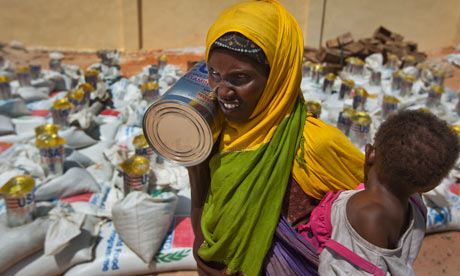Turkish aid in Somalia: the irresistible appeal of boots on the ground
Donors prepared to risk working side by side with the Somali government in Mogadishu will win favour – and contracts

There is an old Somali proverb “I tus oo i taabsii”, which is loosely translated as “show me, let me feel it”. This is the metric by which Somalis will judge commitments made at a recent conference in Brussels, where international donors pledged €1.8bn for Somalia. Indeed, before the ink was dry on the compact, many Somali observers took to social media to question the significance of the agreement.
Somalia has a complicated relationship with donors. For the past 20 years, most have been located in Nairobi due to security concerns. While there are signs that some are slowly relocating to Mogadishu – the UN has already started moving in and the UK has re-established anembassy (of sorts) – frustrations remain with the pace of the shift. Most donors are currently focused on the difficult job of building government capacity and developing institutions – the fruits of which are hard to observe over the short term, and which is all the more difficult to do from Nairobi.
There’s a real need for donors to think outside of the box in Somalia. The government lacks the ability to deliver public services but is deeply suspicious of NGOs, who operate at a distance from the state, limiting opportunities to transfer skills to local government. There is a preference for donors to work more closely with government, to become more flexible and more tolerant of risk and to provide more direct support; in effect, to become more like one of the newer entrants into Somalia’s aidlandscape: Turkey.
If you ask a Somali official which donor is making a difference on the ground, chances are their answer will be Turkey. While the two countries don’t have a long history of engagement, in August 2011 Turkish President Erdoğen became the first non-African head of state to visit Somalia in almost two decades. At the time Somalia was in the midst of a crisis, with over 3.2 million people in need of food aid. The sharp increase in newborn boys being named Erdogen alludes to the appreciation everyday Somalis felt for this display of solidarity. The increasing and sudden engagement of Turkey in humanitarian relief efforts was noted by then UK ambassador to Somalia, Matt Baugh, who acknowledged Turkey’s capacity to bring its political force to bear and to quickly begin to set the pace for long-established donors in Somalia.
Turkey’s aid programme is evolving, but their pioneering modus operandi of having boots on the ground, working side by side with Somalis, advising, coaching and taking risk remains unchanged. They have a growing footprint in the country: building schools, giving scholarships, refurbishing government buildings, and they even provide budget support of $4.5m a month. However, there are two projects that make government officials giddy – a new 400-bed training hospital and an asphalt factory. Little information is publicly available on either project, but a doctor I spoke to in Mogadishu was convinced the hospital has the potential to revolutionise health services for the poor (though he anticipated challenges with identifying “the poor”). It will be staffed by Turkish doctors and managers who will be closely shadowed by their Somali counterparts, with gradual transfer of full responsibility to the government over the next five years. The laying of new roads has begun this week.
Al-Shabaab has also noted Turkey’s role: on 27July a Turkish guest house next to the embassy in Mogadishu was attacked. Security has since been stepped up, but Turkey remains one of a few nations with an embassy outside of the fortified airport, which acts as Somalia’s unofficial“Green Zone”.
Turkey is now capitalising on its reputation for getting things done. In September, the Turkish company Favori LLC took over management of Somalia’s main airport from a Dubai-based company, which had its contract terminated early. The specifics of the deal remain unclear, raising some questions, but the government is optimistic. A few days before the takeover, for the first time in 20 years, a Boeing 747 cargo plane landed at Mogadishu airport, carrying equipment for Favori LLC.
Many Somalis question the sustainability of Turkey’s development assistance but the country insists it’s here for the long term. Other southern donors are returning with their own ambitious plans. The flexibility, speed of delivery and mix of aid and investment of this rising breed of donors – which includes China and Brazil, for example – moving countries like Somalia into an “age of choice”.
Last month, after a high-profile visit to China by the Somali foreign minister, the federal government of Somalia signed an agreement for the Chinese to restart development assistance and rebuild some of the country’s landmarks, scarred by war. As security continues to improve in Mogadishu, the aid landscape is likely to get more complicated, but aid that the Somalis can see and feel – and donors based in Mogadishu – will continue to win favour.
Ahmed Ali is a research officer at the centre for aid and public expenditure at the Overseas Development Institute.
This content is brought to you by Guardian Professional. To get more articles like this direct to your inbox, sign up free to become a member of the Global Development Professionals Network













